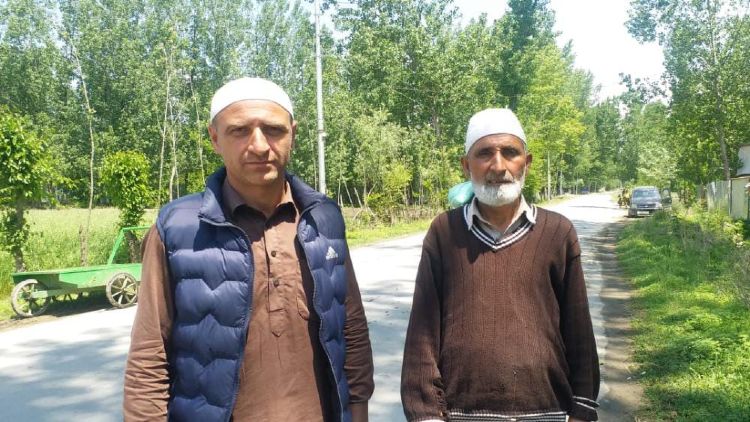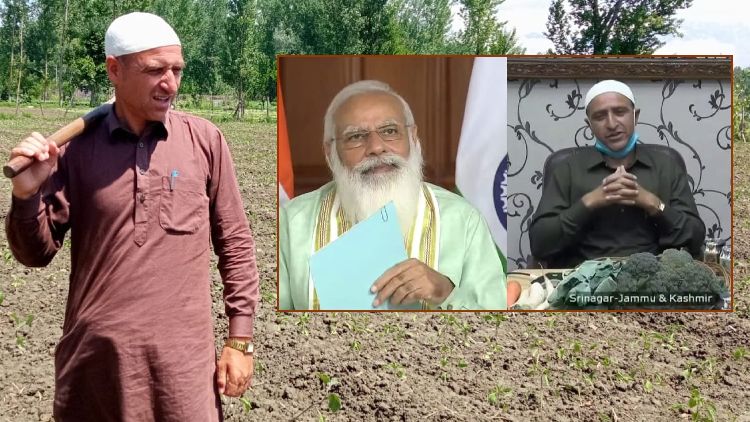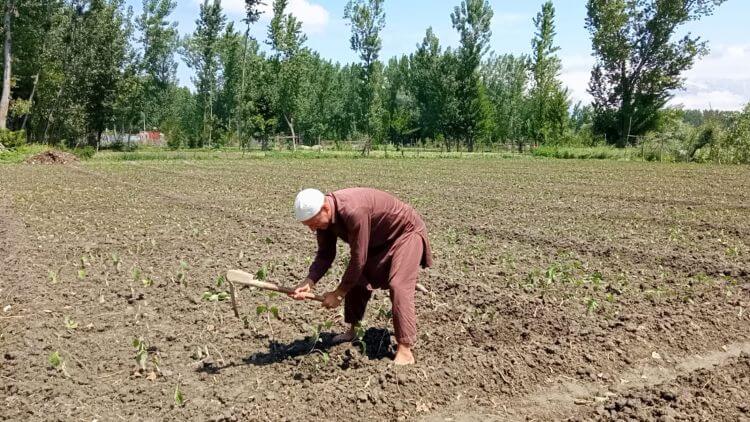
Sajid Rasool/Srinagar
Khursheed Ahmed Reshi, one of the six farmers chosen by the authorities from across the country for interacting with Prime Minister Narendra Modi through video conferencing, is living with his renewed fame after the event.
Khursheed was apparently picked as the face of the new-age Indian farmer who is making farming a conscious career choice and luring more young men and women to see it as a profitable venture. The 40-year old Khursheed is a post-graduate in English literature.
Khursheed hails from Tengpura village located on Srinagar outskirts. The village produces the bulk of the vegetables consumed by people in Srinagar city and its residents are mostly into farming.

Khursheed in his field and (inset) interacting with PM Narendra Modi
After his interaction with Prime Minister, Khursheed has became a role model for the villagers; his family and the villagers celebrated the occasion.
Khursheed got himself trained in organic farming from the Kashmir Department of Agriculture; participated in various workshops and training camps to understand the new techniques of farming that had made farming profitable and therefore an attractive career choice.
He said during the training he realized that he needs to change to a modern style of using the land so that the quality of vegetables improves and he gets a higher yield and also more income.
Making use of all the incentives offered by the government, he started cultivating vegetables in his vast fields. Today not only he is enjoying the fruits of his hard work as he earns well but has also become an inspiration for others, especially the youth.
Talking to him, Prime Minister Modi said that Khursheed's courage and dedication are unparalleled. He also praised Khursheed for his innovation and taking to farming after receiving higher education. He said people like Khursheed are an inspiration to the younger generation.

The son of the soil: Khursheed tilling his land
Modi told him. "You are a real role model for the youth as despite getting a higher education, you finally decided to start farming. Otherwise, most young people after studying in colleges and universities are confused and keep wondering what to do next? "
Speaking to Awaaz The Voice, Khursheed Ahmed said that he has 26 kanals of land out of which he cultivates paddy on 12 kanals of land while vegetables are grown on other 14 kanals.
Khursheed believes that traditional farming is no longer profitable and organic farming gets one huge profit. He also employs a number of workmen on his vegetable farm.
Like most educated persons, Khursheed also tried to look for a government job. When he didn’t get one, he decided to start farming rather than sit idle and wait for the job to fall in his lap.
Today after becoming a successful farmer, Khursheed has left his yearning for a job behind and moved on to become an entrepreneur. “There is a general perception among the people that farming should be left to illiterate farmers,” he said. Khursheed not only rejected the idea but also attracted other educated youth to follow him.
In Jammu and Kashmir, the interest of the youth in agriculture has been declining for the last several years. Notably, the race for government jobs and reliance on non-local labour is significant - on the other hand, there are many young people who are so successful in this field that they have taken up the same field as their career.
